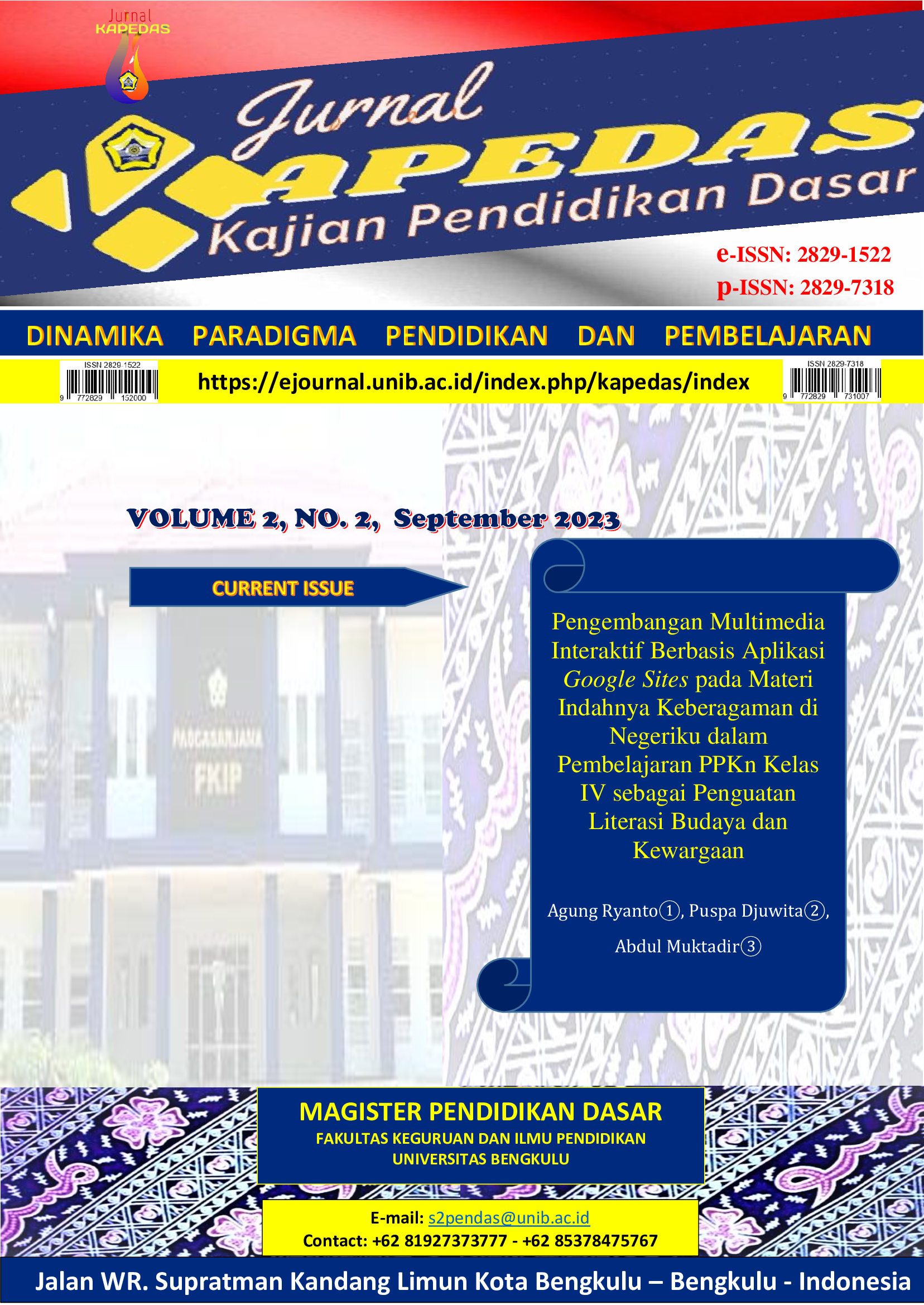Main Article Content
Abstract
The purpose of this study was to analyze the effect of using flipbook media with the STEAM approach on scientific literacy. The type of research used is quasi-experimental research or quasi-experimental research using the Pretest-Posttest Control Group Design. The design of this study was through several processes, namely the pretest, the implementation of learning in the experimental class and the control class and the implementation of the posttest. The types of data used are quantitative and qualitative data using instruments in the form of interviews, needs analysis questionnaires, question instruments, expert validation sheets and user response questionnaires. The use of flipbook media with the STEAM approach has a significant effect on scientific literacy skills in the competency aspect. The average results of competency aspects of scientific literacy in the control class were (85.45). The average results of the competence aspect of scientific literacy in the experimental class were (89.78). The effect size value is (0.91) if the percentage is (82%) in the large category. The use of flipbook media with the STEAM approach can improve scientific literacy skills in context, content and competency aspects in large categories.
Article Details
Copyright (c) 2023 Putu Iwan Tri Susila, Endang Widi Winarni, Irwan Koto

This work is licensed under a Creative Commons Attribution-ShareAlike 4.0 International License.

Karya ini dilisensikan di bawah Creative Commons Attribution-ShareAlike 4.0 International License .
References
- Alchin, D. (2014). From Science Studies to Scientific Literacy: A View from the classroom. Sci & Edu. DOI 10.1007/s11191-013-9672-8
- Fananta, M. R., Widjiasih, A.E., Setiawan, R., Hanifah, N., Miftahussururi., Nento, M.N., Akbari, Q.S., Ayomi, J.M. (2017). Materi Pendukung GLN. Jakarta: Kementerian Pendidikan dan Kebudayaan
- Gunaydin, Y. (2022) The Predictive Power of Reading Comprehension, Attitude Toward Science, Test Tecnique, And Science Subject Matter Knowledge In Predicting Pisa Scientific Literacy Test Score. Participatory Educational Reserch (PER) Vol. 9(6), pp. 206-220, Issn: 2148-6123. Doi: http//dx.doi.org/10.17275/per.22.136.9.6.
- Hasan, M., Milawati., Darodjad., Harapan, T.K., Tahrim, T., Anwari, A.M., Rahmat, A., Masdiana., Indra, I.M. (2021). Media Pembelajaran. Klaten : Tahta Media Group
- Hasnawati, Syaiful. A., Masdafi, Rusdiana. (2019). Model Pembelajaran STEAM (Science, Technologi, Enginering, Art, Matematics) Dengan Pendekatan Saintifik, Makasar : Repositori Kemdikbud.
- Riyanto,S., & Nugroho, B. (2012). Pengembangan Framework Sistem Buku Tiga Dimensi untuk Diseminasi Informasi. Prosiding e-Indonesia Initiativel (ell). Publiser . Bandung : ITB. Doi :10.13140/2.1.4829.2165.
- Sanders, M. (2009). STEM, STEM Education, STEM Mania. The Technology Teacher, December/January 2009.
- Syar, N. I . (2018). Kajian & Pembelajaran IPA MI/SD. Palangkaraya : IAIN
- Walag, A. M. P., Bacarrisas, P., Fajardo, M. T. M., Guimary, F. M. (2022) A Canonical Correlation Analysis of Filipino Science Teachers’ Scientific Literacy and Science Teaching Efficacy. International Journal of Instruction, 15(3), 249-266. E-Issn: 1308-1470. P-Issn: 1694-609X
- Winarni, E.W. (2018). Teori dan Praktik Penelitian Kuantitatif Kualitatif. Jakarta: Bumi Aksara
- Winarni, E.W. (2018). Pendekatan Ilmiah Dalam Pembelajaran Kreatif dan Inovatif. Bengkulu : FKIP UNIB
References
Alchin, D. (2014). From Science Studies to Scientific Literacy: A View from the classroom. Sci & Edu. DOI 10.1007/s11191-013-9672-8
Fananta, M. R., Widjiasih, A.E., Setiawan, R., Hanifah, N., Miftahussururi., Nento, M.N., Akbari, Q.S., Ayomi, J.M. (2017). Materi Pendukung GLN. Jakarta: Kementerian Pendidikan dan Kebudayaan
Gunaydin, Y. (2022) The Predictive Power of Reading Comprehension, Attitude Toward Science, Test Tecnique, And Science Subject Matter Knowledge In Predicting Pisa Scientific Literacy Test Score. Participatory Educational Reserch (PER) Vol. 9(6), pp. 206-220, Issn: 2148-6123. Doi: http//dx.doi.org/10.17275/per.22.136.9.6.
Hasan, M., Milawati., Darodjad., Harapan, T.K., Tahrim, T., Anwari, A.M., Rahmat, A., Masdiana., Indra, I.M. (2021). Media Pembelajaran. Klaten : Tahta Media Group
Hasnawati, Syaiful. A., Masdafi, Rusdiana. (2019). Model Pembelajaran STEAM (Science, Technologi, Enginering, Art, Matematics) Dengan Pendekatan Saintifik, Makasar : Repositori Kemdikbud.
Riyanto,S., & Nugroho, B. (2012). Pengembangan Framework Sistem Buku Tiga Dimensi untuk Diseminasi Informasi. Prosiding e-Indonesia Initiativel (ell). Publiser . Bandung : ITB. Doi :10.13140/2.1.4829.2165.
Sanders, M. (2009). STEM, STEM Education, STEM Mania. The Technology Teacher, December/January 2009.
Syar, N. I . (2018). Kajian & Pembelajaran IPA MI/SD. Palangkaraya : IAIN
Walag, A. M. P., Bacarrisas, P., Fajardo, M. T. M., Guimary, F. M. (2022) A Canonical Correlation Analysis of Filipino Science Teachers’ Scientific Literacy and Science Teaching Efficacy. International Journal of Instruction, 15(3), 249-266. E-Issn: 1308-1470. P-Issn: 1694-609X
Winarni, E.W. (2018). Teori dan Praktik Penelitian Kuantitatif Kualitatif. Jakarta: Bumi Aksara
Winarni, E.W. (2018). Pendekatan Ilmiah Dalam Pembelajaran Kreatif dan Inovatif. Bengkulu : FKIP UNIB
